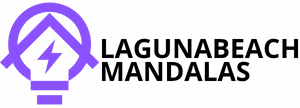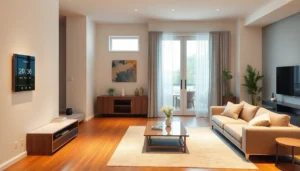Imagine living in your dream home while someone else pays your mortgage. Sounds like a fantasy, right? Welcome to the world of house hacking room rentals, where savvy homeowners turn their extra space into a money-making machine. It’s like having a roommate who actually helps you live rent-free—who wouldn’t want that?
Whether you’ve got a spare room, a basement suite, or even a cozy attic, house hacking offers a clever way to boost your income and lighten your financial load. With a little creativity and some strategic planning, anyone can transform their home into a rental haven. So grab your notepad and get ready to explore the ins and outs of turning your living space into a profitable venture. After all, who says you can’t have your cake and eat it too?
Table of Contents
ToggleUnderstanding House Hacking Room Rentals
House hacking offers a strategic approach for homeowners to earn income by renting space. This method often involves converting spare rooms or other unutilized areas into rental units.
What Is House Hacking?
House hacking refers to the practice of using part of a primary residence for rental purposes. It allows homeowners to offset their living expenses, making homeownership more affordable. Renting out a room, basement, or attic can generate significant cash flow. Locations with high demand for rentals often yield higher earnings. Some homeowners even invest in multi-family properties, living in one unit while renting out others. Understanding local rental laws is crucial for success in this venture.
Benefits of House Hacking Room Rentals
House hacking room rentals provide various financial advantages. Increased cash flow from multiple tenants can substantially reduce monthly mortgage payments. Homeowners often find they can cover costs like utilities and property taxes through rental income. Added to this, tenants can help maintain the property, improving its overall upkeep. This approach also offers flexibility; individuals can adjust rental arrangements as needed. Long-term, homeowners can build equity while enjoying lower living expenses.
How to Get Started with House Hacking
House hacking begins with careful planning and consideration of the ideal property for rental income.
Finding the Right Property
Identifying the right property is critical for successful house hacking. Look for homes with additional space such as basements, attics, or spare rooms. Consider locations with high rental demand, proximity to public transport, and local amenities. Analyze the neighborhood to ensure it attracts tenants willing to pay a fair rental price. Evaluate potential properties based on the expected rental income, property prices, and operating expenses. Furthermore, assess zoning laws and regulations to confirm compliance for rental purposes. This preparatory work contributes to long-term profitability and smooth operations.
Setting Up the Space for Rentals
Creating an inviting rental space increases its attractiveness. Begin by investing in necessary repairs and upgrades to maintain appeal. Furnishing the rental unit enhances comfort and can justify higher rental rates. Prioritize privacy and access for tenants, ensuring separate entrances and appropriate facilities. Personal touches like decor and amenities improve the overall experience. Utilizing online platforms to showcase rental spaces can also attract potential tenants. Setting clear rental agreements establishes expectations, which fosters mutual respect between landlord and tenant.
Financial Considerations
Understanding the financial aspects of house hacking is crucial for maximizing rental income. Homeowners can benefit from a clear overview of the costs and potential income associated with room rentals.
Costs Involved in House Hacking
Various costs arise when homeowners engage in house hacking. Property maintenance expenses need careful attention, often including repairs and routine upkeep. Utility costs may increase due to additional tenants, which impacts monthly budgets. Insurance costs also rise, necessitating proper coverage for rental activities. Local property taxes could shift as rental income increases, influencing overall financial viability. Furnishing the rental space comes with associated costs, so purchasing essential items is necessary to attract tenants.
Potential Income from Room Rentals
Room rentals can significantly boost a homeowner’s income. High-demand areas often yield higher rental prices, maximizing cash flow for owners. Renting out a room may generate an income ranging from $500 to $2,000 monthly, depending on the location. Multiple tenants can enhance earning potential, particularly in larger or well-positioned homes. Seasonal rentals may offer lucrative opportunities in tourist destinations, allowing homeowners to capitalize on high occupancy rates. Understanding market trends enables homeowners to set competitive prices, ensuring optimal rental income.
Legal and Regulatory Aspects
Understanding legal and regulatory aspects is crucial for house hacking through room rentals. Proper adherence to local regulations ensures a smooth rental experience and compliance with laws.
Zoning Laws and Regulations
Zoning laws dictate how properties can be used within a jurisdiction. Homeowners must verify property classification to ensure renting rooms complies with local zoning regulations. A residential property may have specific restrictions on the number of occupants allowed. Many municipalities require homeowners to obtain permits for rentals or register their properties as short-term rentals. Researching local ordinances can prevent fines and legal issues. Compliance with occupancy limits and safety requirements, such as fire codes, is essential for tenant safety and can safeguard against liability claims.
Lease Agreements and Tenant Rights
Creating solid lease agreements protects both landlords and tenants. A well-drafted lease outlines rental terms, payment schedules, and property rules, preventing misunderstandings. It’s vital to incorporate state-specific tenant rights to uphold legal standards. Landlords should clarify rights regarding property maintenance, security deposits, and termination of tenancy. Knowing tenant rights helps landlords avoid disputes and fosters positive relationships. Regular communication with tenants ensures transparency and builds trust, benefiting the rental experience for both parties.
Tips for Successful House Hacking
Effective house hacking requires thorough planning and execution. Homeowners can maximize their rental experience by focusing on key areas.
Finding Reliable Tenants
Finding reliable tenants involves using multiple strategies. Advertise rental spaces on popular platforms such as Craigslist and Zillow. Clearly outline property details and rental terms to attract serious inquiries. Consider conducting background checks for financial stability, rental history, and criminal records. Effective screening ensures landlords select trustworthy individuals. Utilize rental applications to collect necessary information efficiently. Communicating expectations upfront can help maintain transparency. Trust is built on honesty, so be clear about house rules and lease conditions. Establishing a reliable tenant mix can lead to improved rental experiences and consistent income.
Maintaining a Good Landlord-Tenant Relationship
Maintaining a good landlord-tenant relationship enhances overall satisfaction. Open communication channels make it easier for tenants to voice concerns. Scheduling regular check-ins helps address issues promptly. Respecting tenants’ privacy fosters trust and encourages cooperation. Providing timely maintenance boosts tenant satisfaction and retention rates. Inclusion of clear lease terms regarding responsibilities minimizes misunderstandings. Flexibility in payment arrangements can strengthen relationships during financial hardships. A welcoming atmosphere promotes positive interactions and reinforces tenant loyalty. Strong relationships contribute to a harmonious living environment and ensure long-term success in house hacking.
House hacking through room rentals offers a practical solution for homeowners looking to reduce living expenses while generating income. By utilizing extra space creatively and strategically, they can enhance their financial stability and potentially achieve mortgage-free living.
Understanding local regulations and fostering strong relationships with tenants are key components of a successful house hacking experience. This approach not only helps in covering costs but also builds equity over time.
With careful planning and the right property, homeowners can turn their living spaces into lucrative rental opportunities, making house hacking an attractive option for those seeking financial freedom.




